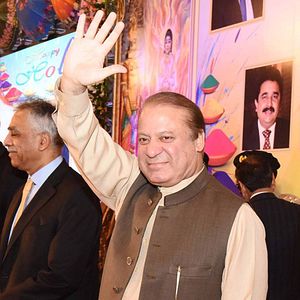In most democracies, the head of government attending a religious minority’s festival, acknowledging their role in the country, and reassuring them about the future, would be natural, if not the bare minimum.
But Pakistan Prime Minister Nawaz Sharif’s address on Tuesday to mark a Holi event organized by the local Hindu community in Karachi was historic for doing all of the above; such has been the level of discrimination against the minorities, and the rulers’ appeasement – if not endorsement – of Islamist supremacists in Pakistan.
Nawaz had already become the first Pakistani premier to attend a Diwali event in 2015, where he called himself the “prime minister of all religious communities.” The PM’s Tuesday address, however, was unprecedented for calling out the radical brand of Islam, and narrow interpretation of Pakistan’s history, as the foundation of religious extremism in the country.
Previously, even those vying to address Islamist terrorism have tried to completely disassociate the religion from any violence. On Tuesday, the PM, in calling out a “twisted” version of Islam, touched upon an ideology that forms the basis of religious extremism.
“Some people have been using religion to create divides. For this purpose they use Islam…” Sharif said. In another reference to the Islamists’ claims of Muslim hegemony over the afterlife, which also acts as a lure for potential jihadists, he added: “It is not up to us to decide whether one will go to the heaven or hell, but to make this place a heaven on earth.”
The most unambiguous of his words calling out Islamist supremacy were: “Pakistan was not made so one religion can dominate over others.”
Again touching on the use of Islam to forcibly convert non-Muslims, which the Hindu community especially has had to suffer, he said: “Islam does not support religious coercion or forcible conversion.”
While his endeavor to address the ideology behind violent Islamist supremacy is significant in the context of Pakistan’s war on terror, which has been reduced to scratching the surface through relentless military operations, it was his revisionism of Pakistan’s creation that was truly groundbreaking, especially in the context of Hindu-Muslim relations.
In addition to negating the thought that Pakistan was created with the intention to ensure Muslim supremacy, Nawaz suggested that the very idea behind Pakistan was to quell religious dominance. “Pakistan’s creation itself was a struggle against religious oppression,” he said.
In this regard, he even quoted the founding leader Muhammad Ali Jinnah’s famous August 11, 1947 address to the Constituent Assembly of Pakistan, three days before the state’s creation, where he said: “You are free; you are free to go to your temples, you are free to go to your mosques or to any other place or worship in this State of Pakistan. You may belong to any religion or caste or creed that has nothing to do with the business of the State “
Jinnah’ speech was removed, and is still missing, from Radio Pakistan archives. It was also blacked out in the newspapers the next day, censored during military regimes and removed altogether from many official records. This should explain the political taboo surrounding acknowledgement of the speech that Sharif quoted on Tuesday.
Notwithstanding Jinnah’s own paradoxes, the Muslim League’s Two Nation Theory founding the separatism of Pakistan movement, or indeed the oversimplification of Sharif’s historical revisionism, every progressive state has had to reconcile with its past.
If the idea that “Hindus and Muslims cannot coexist” continues to be sold and taught in Pakistan, the state will not be able to safeguard its Hindus, or other religious communities. This has been the major cause behind the continued exodus of Hindus from Pakistan.
Even so, as groundbreaking as Sharif’s vision and words might be, now comes the most difficult part: the implementation.
Before last year’s Pamana Papers revelations increased political pressure on them, the ruling PML-N had taken many steps to counter Islamist monopoly. These included asking the Punjab police to take down anti-Ahmadiyya banners, unblocking YouTube, passing a progressive women’s rights law amidst immense political pressure, and executing Mumtaz Qadri for killing former Punjab governor Salmaan Taseer over blasphemy.
Even though the Holi address might appear to be a corollary – or even an exhibit – of the political strength of Sharif, who had to woo Islamists for support following the Panama Leaks amidst the opposition’s threat to lock down the capital, his speech for religious tolerance comes parallel to the state’s crackdown on “blasphemers” and nonbelievers.
It would be naïve to expect the state to jump from taking baby steps toward religious coexistence to acceptance for free thought. But the government needs to realize that its internet clampdown will erode the progressive vision that the prime minister’s words espouse.
For Pakistan to truly “make religious diversity its strength” it would need constitutional secularization and safeguarding of the freedoms that the state legally retracts. Unless pluralism, tolerance, and uncompromising equality are codified in the Constitution, Pakistan’s religious minorities would remain at the mercy of individual leaders, or serve as scapegoats for populist politics.

































